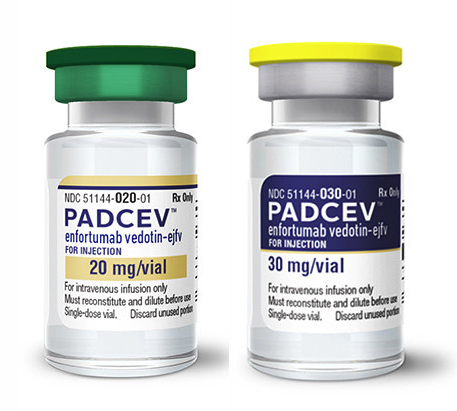Keytruda (pembrolizumab) vs Padcev (enfortumab vedotin-ejfv)
Keytruda (pembrolizumab) vs Padcev (enfortumab vedotin-ejfv)
Keytruda (pembrolizumab) is an immune checkpoint inhibitor that works by blocking the PD-1 pathway, thereby enhancing the body's immune response against cancer cells, and is widely used in various types of cancers, including melanoma, lung cancer, and head and neck cancers. Padcev (enfortumab vedotin-ejfv) is an antibody-drug conjugate specifically targeting Nectin-4, a protein found on the surface of some cancer cells, and is used to treat urothelial cancer, particularly when it has spread or cannot be removed by surgery. When deciding between Keytruda and Padcev, it is essential to consider the type of cancer being treated, the specific molecular targets present in the cancer cells, and the patient's overall health and treatment history, as these medications have different mechanisms of action and are approved for different indications.
Difference between Keytruda and Padcev
| Metric | Keytruda (pembrolizumab) | Padcev (enfortumab vedotin-ejfv) |
|---|---|---|
| Generic name | Pembrolizumab | Enfortumab vedotin-ejfv |
| Indications | Various types of cancers including melanoma, lung cancer, head and neck cancer, classical Hodgkin lymphoma, and others | Locally advanced or metastatic urothelial cancer |
| Mechanism of action | Programmed death receptor-1 (PD-1) blocking antibody | Antibody-drug conjugate targeting Nectin-4 |
| Brand names | Keytruda | Padcev |
| Administrative route | Intravenous infusion | Intravenous infusion |
| Side effects | Fatigue, musculoskeletal pain, decreased appetite, pruritus, diarrhea, nausea, rash, pyrexia, cough, dyspnea, constipation, pain in extremity, and headache | Peripheral neuropathy, fatigue, decreased appetite, rash, alopecia, nausea, altered taste, diarrhea, dry eye, pruritus, and dry skin |
| Contraindications | Individuals with hypersensitivity to pembrolizumab or any of its excipients | Individuals with hypersensitivity to enfortumab vedotin-ejfv, or any of its excipients |
| Drug class | Anti-PD-1 monoclonal antibody | Antibody-drug conjugate |
| Manufacturer | Merck & Co., Inc. | Astellas Pharma Inc. and Seagen Inc. |
Efficacy
Keytruda (Pembrolizumab) in Urothelial Carcinoma
Keytruda (pembrolizumab) is a highly effective immunotherapy drug used in the treatment of urothelial carcinoma, which is a type of cancer that occurs in the urinary system, including the bladder, ureters, and urethra. Pembrolizumab is a programmed death receptor-1 (PD-1) blocking antibody that helps the immune system to detect and fight cancer cells. It has been approved for patients with locally advanced or metastatic urothelial carcinoma who are not eligible for cisplatin-containing chemotherapy, and for patients who have disease progression during or following any platinum-containing chemotherapy, or within 12 months of neoadjuvant or adjuvant treatment with platinum-containing chemotherapy.
Clinical trials have demonstrated the efficacy of pembrolizumab in this patient population. The KEYNOTE-045 study, for instance, showed that pembrolizumab significantly improved overall survival compared to chemotherapy in patients with advanced urothelial carcinoma who had previously received platinum-based chemotherapy. The median overall survival was notably better in the pembrolizumab-treated group, establishing it as a preferred option for second-line therapy in this setting.
Padcev (Enfortumab Vedotin-ejfv) in Urothelial Carcinoma
Padcev (enfortumab vedotin-ejfv) is another innovative treatment for urothelial carcinoma, specifically for patients who have previously received a PD-1 or PD-L1 inhibitor and platinum-containing chemotherapy. Enfortumab vedotin-ejfv is an antibody-drug conjugate that targets Nectin-4, a protein found on the surface of many urothelial carcinoma cells, and delivers a cytotoxic agent directly to the cancer cells. This targeted approach allows for the destruction of cancer cells while sparing normal, healthy cells.
The efficacy of Padcev was evaluated in a clinical trial known as EV-201, which enrolled patients with locally advanced or metastatic urothelial cancer who had previously been treated with a PD-1 or PD-L1 inhibitor and platinum-based chemotherapy. The results showed a significant response rate with a meaningful percentage of patients achieving complete or partial responses. The median duration of response also indicated a lasting benefit for those who responded to the therapy. These findings have positioned Padcev as a valuable treatment option for patients with advanced urothelial carcinoma who have limited alternatives due to prior therapies.
Regulatory Agency Approvals
Keytruda
-
European Medical Agency (EMA), European Union

-
Food and Drug Administration (FDA), USA

-
Health Canada

-
Therapeutic Goods Administration (TGA), Australia

-
Medsafe (NZ)

Padcev
-
Food and Drug Administration (FDA), USA

Access Keytruda or Padcev today
If Keytruda or Padcev are not approved or available in your country (e.g. due to supply issues), you can access them via Everyone.org.
How it works

Make an enquiry
Choose the medicine you want to buy, answer a couple of questions, and upload your prescription to speed things up. We’ll get back to you within 24 hours.


Make an enquiry
Choose the medicine you want to buy, answer a couple of questions, and upload your prescription to speed things up. We’ll get back to you within 24 hours.


Breeze through the paperwork
We'll guide you through the required documents for importing unapproved medicine, ensuring you have all the necessary information.


Get a personalized quote
We’ll prepare a quote for you, including medicine costs and any shipping, administrative, or import fees that may apply.


Receive your medicine
Accept the quote and we’ll handle the rest - sourcing and safely delivering your medicine.

Some text on this page has been automatically generated. Speak to your physician before you start a new treatment or medication.
Let's talk
If you have any questions, call us or send us a message through WhatsApp or email:
Contact us




